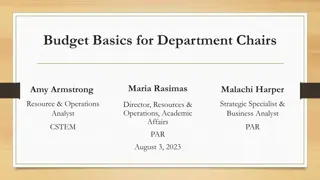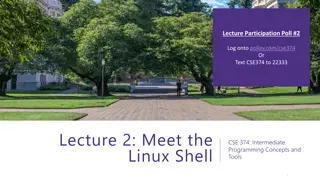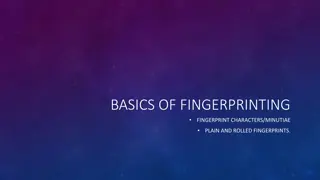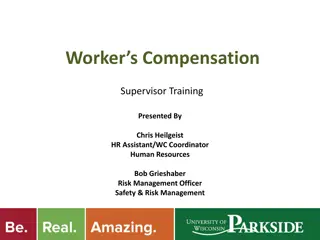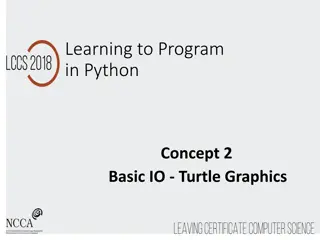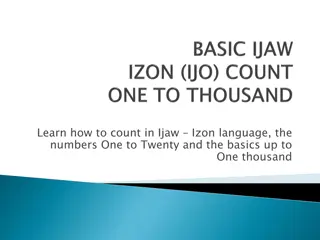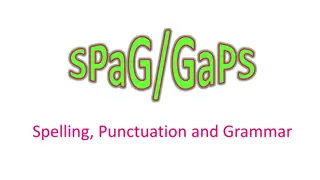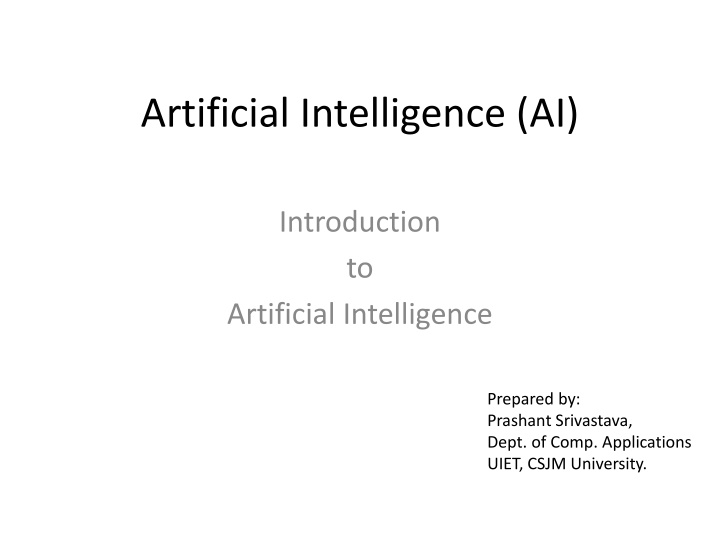
Introduction to Artificial Intelligence: AI Primer and Turing Test
Explore the concept of intelligence, human advancements, and the definition of Artificial Intelligence (AI) through an informative primer, covering the history, goals, and notable achievements in the field. Discover the exciting world of AI, from cognitive simulations to the Turing Test proposed by Alan Turing in 1950.
Download Presentation

Please find below an Image/Link to download the presentation.
The content on the website is provided AS IS for your information and personal use only. It may not be sold, licensed, or shared on other websites without obtaining consent from the author. If you encounter any issues during the download, it is possible that the publisher has removed the file from their server.
You are allowed to download the files provided on this website for personal or commercial use, subject to the condition that they are used lawfully. All files are the property of their respective owners.
The content on the website is provided AS IS for your information and personal use only. It may not be sold, licensed, or shared on other websites without obtaining consent from the author.
E N D
Presentation Transcript
Artificial Intelligence (AI) Introduction to Artificial Intelligence Prepared by: Prashant Srivastava, Dept. of Comp. Applications UIET, CSJM University.
What is Intelligence? The ability to learn (and in many cases, think) is a wonderful quality. No matters who possess it, be an insects, animal or human. In animal kingdom, it is essential of survival in most of the cases. (i.e. sensing the danger, procuring the food etc) Humans having the larger brains, started forming the societies for safety, evolved languages for communication, domesticated and protected flora and fauna for its own benefits, discovered fire, wheel and numerous other tools.
What is Intelligence? Human race keep on developing beyond necessities and developed music, art, literature, sculpture and many more. We exhibit intelligent behaviour without even noticing. Like going to shade when we feel hot under the sun or vice-versa. The advancements, we see all around, from nuclear energy to journey to moon to video meetings and others are the results of intelligence and thinking capability of the human.
AI: A primer The terms AI was coined by John McCarthy in 1956 during Dartmouth Conference. We still don t have an exclusive and exhaustive definition of AI. All definitions cover one aspect of AI or other. We call programs Intelligent , if they exhibit behaviours that would be regarded intelligent if were exhibited by human beings Herbert Simon
AI: A primer AI is the study of techniques for solving exponentially hard problems in polynomial time by exploiting knowledge about the problem domain Elaine Rich AI is the study of mental faculties through the use of computational models Charnik & Drew McDermott The fundamental goal of this research is not merely to mimic intelligence or produce clever fake. AI wants the genuine article: machines with minds John Haugeland
AI: A primer Thus, we see that there is no universally accepted definition of AI. AARON, a computer program could paint. Experiments in Musical Intelligence (EMI) could compose quality music. DeepThought , a chess playing program beat grandmaster David Levy in 1968. On February 10, 1996, after three hours, world chess champion Garry Kasparov lost the first game of a six- game match against DeepBlue , an IBM computer, capable of evaluating 200 million moves per second.
The Turing Test Alan Turing in 1950, proposed a test (The Imitation Game) to determine if a machine (computer program) is really intelligent. According to the Turing Test, an interrogator has to distinguish between a man (who tries to mislead the interrogator) and a woman on the basis of textual responses. As per Turing, if we replace the man by a machine and still the interrogator couldn t judge it, then the machine could be considered as intelligent.
The Challenges before AI We can broadly classify the AI problems in three domains. The spectrum is very wide. Expert Level: Financial analysis, Engineering tasks, Scientific researches etc. Formal Tasks: Playing mathematical problems etc. Routine Tasks: Reasoning, perception, robot navigation, natural language processing. logical games,
The Problem In order to solve a problem, one should Define it precisely, ie the initial state(s), final state(s). Analyze the problem. Find the important point. Gather all the task relevant knowledge in an appropriate format. Choose the best technique and apply.











